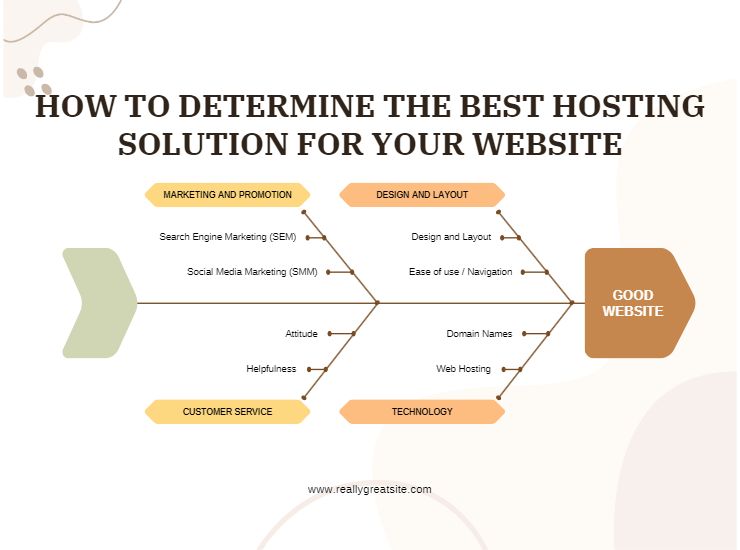How to Determine the Best Hosting Solution for Your Website
Introduction
When it comes to establishing an online presence, selecting the right hosting provider is crucial for the success of your website. With countless options available, it can be overwhelming to determine which hosting solution is the best fit for your needs. This article will guide you through the process of understanding and evaluating different hosting options, enabling you to make an informed decision. By considering factors such as your website’s requirements, reliability, server performance, scalability, security, customer support, pricing, and user reviews, you can ensure that your hosting choice aligns with your goals. Let’s delve into the details.
Understanding Different Types of Hosting
Before embarking on your search for the best hosting solution, it’s important to grasp the various types of hosting available. The most common options include shared hosting, virtual private servers (VPS), dedicated servers, cloud hosting, and managed WordPress hosting. Each type offers unique features, benefits, and limitations. Understanding the distinctions will help you narrow down your choices and identify the most suitable option for your website.
Assessing Your Website’s Requirements
To determine the best hosting solution, start by assessing your website’s specific requirements. Consider factors such as the type of website you have (e.g., personal blog, e-commerce store, corporate site), expected traffic volume, content management system (CMS) preferences, resource demands, and anticipated growth. By identifying your website’s needs, you can narrow down the hosting options that align with your requirements.
Considering Reliability and Uptime
Reliability and uptime are crucial considerations for any website. A reliable hosting provider ensures that your website remains accessible and functional without frequent downtime or interruptions. Look for providers that offer robust uptime guarantees, redundant infrastructure, and reliable backup systems. Reading reviews and seeking recommendations can provide valuable insights into the reliability and uptime track record of different hosting providers.
Evaluating Server Performance
Server performance plays a significant role in delivering a fast and responsive website experience to your visitors. Factors such as server hardware, processing power, memory, and disk storage affect the overall performance. Opt for hosting providers that utilize high-quality hardware and offer sufficient resources to handle your website’s demands effectively. Look for features like solid-state drives (SSDs), content delivery networks (CDNs), and caching mechanisms to enhance performance further.
Examining Scalability and Flexibility
Scalability and flexibility are crucial aspects to consider, especially if your website is expected to grow over time. Choose a hosting solution that allows easy scalability, enabling you to accommodate increased traffic and resource requirements seamlessly. Options such as VPS or cloud hosting often provide scalability benefits, allowing you to upgrade or downgrade resources based on your website’s needs.
Reviewing Security Features
Website security is of utmost importance in today’s digital landscape. Ensure your hosting provider offers robust security measures to protect your website from threats such as hacking attempts, malware, and data breaches. Look for features like SSL certificates, firewalls, regular backups, and malware scanning. A secure hosting environment gives you peace of mind and safeguards your website and visitors’ data.
Analyzing Customer Support
Prompt and reliable customer support is invaluable when it comes to hosting. Evaluate the level of customer support provided by different hosting companies. Look for options that offer 24/7 support through multiple channels, such as live chat, email, or phone. Read reviews and assess the response time and effectiveness of their support team. Quality customer support ensures that any issues or concerns are addressed promptly, minimizing downtime and disruptions.
Comparing Pricing and Value
While pricing shouldn’t be the sole determining factor, it’s essential to compare the costs associated with different hosting providers. Consider the value you receive in relation to the pricing plans. Look for features, resources, and support included in the packages. Some providers offer additional perks such as free domain registration, website builders, or advertising credits, which can add value to your hosting plan.
Seeking User Reviews and Recommendations
Harness the power of user reviews and recommendations to gain insights into the hosting providers you’re considering. Check online forums, review websites, and social media platforms to gather feedback from existing or past customers. Pay attention to recurring positive or negative comments about reliability, performance, customer support, and overall satisfaction. User reviews can provide real-world experiences that help you make an informed decision.
Making an Informed Decision
After thoroughly evaluating different hosting options based on your website’s requirements, reliability, performance, scalability, security, customer support, pricing, and user reviews, it’s time to make an informed decision. Choose the hosting solution that best aligns with your needs and budget. Consider factors such as long-term growth potential, room for scalability, and the ability to upgrade or switch providers if necessary. Remember, selecting the right hosting solution sets a solid foundation for your online success.
Conclusion
In conclusion, understanding and selecting the best hosting solution for your website requires careful consideration of multiple factors. By assessing your website’s requirements, considering reliability, evaluating server performance, examining scalability, reviewing security features, analyzing customer support, comparing pricing and value, and seeking user reviews, you can make an informed decision. Remember to align your hosting choice with your specific needs and goals. With the right hosting provider, your website can thrive and deliver an exceptional user experience to visitors.
Frequently Asked Questions (FAQs)
1. How do I know which hosting type is suitable for my personal blog? When choosing a hosting type for your personal blog, consider factors such as expected traffic volume, resource requirements, and budget. Shared hosting is often a cost-effective option for starting a personal blog.
2. What is the importance of uptime in hosting? Uptime is crucial because it ensures your website remains accessible to visitors. Hosting providers with higher uptime guarantees minimize potential downtime and keep your website available around the clock.
3. Can I upgrade my hosting plan as my website grows? Yes, many hosting providers offer scalability options that allow you to upgrade your hosting plan as your website’s traffic and resource demands increase. VPS or cloud hosting are often suitable for scaling up.
4. Is it necessary to have SSL certificates for my website? Yes, SSL certificates are essential for website security, particularly if you handle sensitive information or accept online payments. They encrypt data transmitted between your website and visitors, ensuring privacy.
5. What if I’m not satisfied with my hosting provider? Can I switch? Yes, you can switch hosting providers if you’re not satisfied with your current one. Evaluate the terms of service and ensure you have backups of your website files and databases before initiating the switch.







